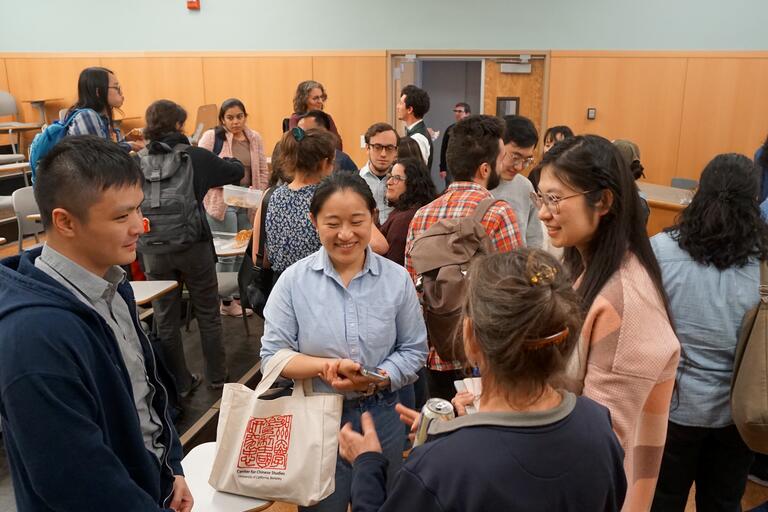Thank you to Alex Pan, Civil and Environmental Engineering, Meiqing Li, Department of City and Regional Planning, and Fangyu Wu, Electrical Engineering and Computer Sciences, who presented their doctoral research at the Transportation Seminar on Apr. 26, 2024.
Alex Pan: Shared dreams, unshared burdens: Exploring complexities of housing and transportation for low- and moderate-income residents of Contra Costa County
Abstract: Suburban poverty in the United States has been growing since the end of the twentieth century, yet understanding of the low-income suburban population and their housing and transportation challenges is still under-developed. Existing studies use an income threshold defined by the federal poverty line and nationwide data aggregated across metropolitan areas, an approach that masks significant regional variations in cost of living and housing and transportation patterns that have been shaped by local policies. My dissertation aims to foster a better understanding of how housing availability and transportation accessibility differs across suburban areas and demographic groups within the low-income suburban population to advance more effective policy options. I use a case study of Contra Costa County and analyze data from the Public Use Microdata Sample (PUMS) from the U.S. Census, as well as data collected from surveys and interviews with low- and moderate-income (LMI) Contra Costa residents. In this talk, I summarize some of the main findings from my dissertation using specific examples that illustrate the effectiveness of mixed quantitative and qualitative methods and the case study approach to capture the diversity of experiences of LMI Contra Costa residents. I also explore the potential of microtransit to address gaps in public transit service in suburban areas, a common transportation issue identified by LMI Contra Costa residents.
Bio: Alexandra Pan completed her PhD in Civil and Environmental Engineering with a designated emphasis in Global Metropolitan Studies at U.C. Berkeley in 2023. Her research interests include shared mobility, public transit, and the intersection of housing and transportation behavior for low-income residents. Prior to her time at Berkeley, she completed her B.S. in Mechanical Engineering at Columbia University in 2016. Currently, she is a Transportation Planner at the San Francisco County Transportation Authority.
Meiqing Li: Integrated Active Transportation Planning: Cultures, Trends, and Behaviors in Hong Kong and San Francisco
Abstract: This talk will introduce two case studies of my dissertation project, entitled “Integrated Active Transportation Planning: Cultures, Trends, and Behaviors in Hong Kong and San Francisco”. In the first study, I examine the relationship between planning institutions and civic advocacy groups in promoting active transportation in Hong Kong, and the roles of social media in facilitating this process. I adopt a mixed method approach to quantitatively analyze social media content made by four placemaking NGOs in Hong Kong accompanied by stakeholder interviews and field observation, during a period between 2020 and 2022, amid the COVID-19 pandemic and major protests. In the second case study, I investigate the impact of active transportation plans on the built environment change due to plan implementation in the San Francisco Bay Area. Specifically, it identifies the pedestrian infrastructure change over time, hot spots as well as the association with the presence of bike, pedestrian or active transportation plans.
Bio: Meiqing Li is a Ph.D. Candidate in City and Regional Planning at UC Berkeley, expected to graduate in Summer 2024. Previously, she received a Master of City Planning with a Certificate in GIS and Spatial Analysis from Weitzman School of Design, University of Pennsylvania, and a B.A. in Urban Studies and Economics from the University of Hong Kong. Meiqing’s research explores the intersection of sustainable transportation, travel behavior, and built environment in the United States and Asia. She was the recipient of the Wendy Tao International Smart Cities Scholarship, and the Liu Graduate Research Fellowship in Chinese Studies.
Fangyu Wu: From Legacy to Future: Charting Next Decades of Autonomous Driving
Abstract: Autonomous driving technology stands poised to transform our transportation infrastructure. Despite substantial advancements by both industry and academia over the past decades, the widespread adoption of autonomous vehicles remains on the horizon. In this talk, we delve into the opportunities that lie ahead in our quest for a fully automated transport system. Specifically, we delineate the anticipated, sometimes overlooked, milestones in automated driving for the ensuing 5, 10, and 50 years. Within a 5-year horizon, we present algorithms that mitigate congestion propagation on highways by selectively controlling a distributed set of vehicles. In a decade, we underscore the significance of analyzing human driving patterns in unstructured environments and the imperative for autonomous systems to replicate such behaviors. Looking half a century forward, we propose a vision where our entire transportation framework redefines itself through centralized optimization.
Bio: Fangyu Wu is a fifth-year PhD student under the guidance of Prof. Alexandre Bayen in the Electrical Engineering and Computer Sciences department at the University of California, Berkeley. He earned his B.S. and M.S. degrees in Civil and Environmental Engineering from the University of Illinois at Urbana-Champaign in 2016 and 2018, and an M.Eng. in EECS from UC Berkeley in 2019. His research interests encompass optimization approaches to multiagent robotic systems, with a focus on planning and control of automated vehicles. His notable distinctions include graduation with the Highest Honour from UIUC in 2016, the Dwight David Eisenhower Transportation Fellowship in 2019, and the Best Paper Award in Transportation Research Part C: Emerging Technologies in 2020.









